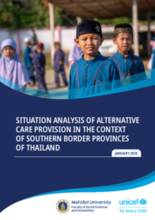This study addresses a critical knowledge gap regarding alternative care in Thailand's Southern Border Provinces (Pattani, Yala, Narathiwat, Satun, and Songkhla), where the population is predominantly Muslim with a strong ethnic Malay identity. The research investigates various forms of alternative care, including institutional care (Pondok and Hafiz institutions, government boarding schools, private orphanages) and family-based care, examining the quality of care, available social services, and cultural context. Key findings reveal the prevalence of religious institutions in alternative care, the importance of cultural and religious sensitivity in service delivery, and the need for improved child safeguarding policies and enhanced social services to support families and children. The report offers policy recommendations focused on enhancing the quality of residential care, registering traditional Islamic institutions, strengthening child protection mechanisms, and protecting children without adequate parental care.

